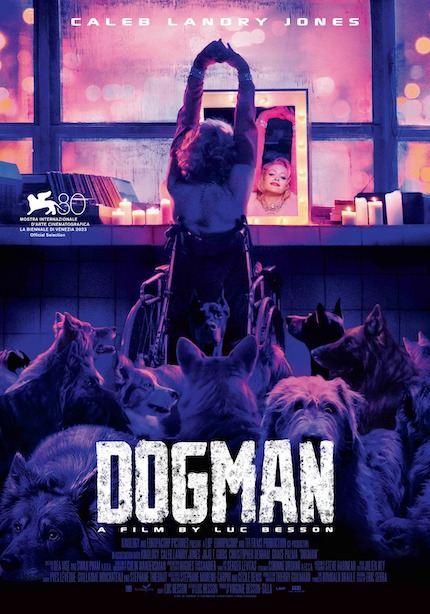DOGMAN Review: Reality Literally Bites in Luc Besson's Latest Crime Film

On a cinematically rainy night, a truck packed with dogs is pulled over by the cops.
The driver is Marilyn Monroe in the famous getup from Gentlemen Prefer Blondes. The pink, the wig and the makeup ruined by blood.
At the station, the driver, a wheelchair-using fellow named Douglas Munrow (Caleb Landry Jones), is visited by police psychologist Evelyn (Jojo T. Gibbs), a single mother who has her own history with violence. Douglas starts telling his story.
The narrative jumps back and forth, between the present and the non-linear past that holds so many things: an abusive family, Shakespeare, unrequited love, crafty heists, drag artists and chili. Most of all, it holds a lot of pain. And dogs. So many dogs.
Let’s get it out of the way: Dogman is not Joker. Neither is it a “poor man’s version of Joker” as some tend to refer to it. In fact, the only thing Luc Besson’s latest film has in common with Todd Phillips’ effort, is the figure of a vulnerable outsider in the center, as well as the slot in the Venice Film Festival's competition.
Besson’s film wasn’t universally loved there. Mostly. its participation seemed to confuse a lot of people: a campy, over the top sentimental “misery memoir” where dogs basically perform magic tricks, kind of felt out of place next to Yorgos Lanthimos’s Poor Things, Pablo Larraín’s El Conde, Sofia Coppola’s Priscilla and Ava DuVernay’s Origin.
In truth, that’s how Besson has always been, an auteur who likes shiny things and visually compelling action; camp and sentimentality are his usual aesthetic tools. Honestly, it’s just better for everyone when he’s not trying to be too serious or too realistic or too grandiose.
Dogman is not a film with big ideas or great ambitions; it’s a series of amusement rides. There are prolonged lip-sync cabaret numbers in full drag. A montage of the cheesy school staging of Shakespeare. Dogs doing all kinds of stuff, like fetching food and diamond jewelry, as well as participating in simplistic but effective schemes of protecting the weak. And yes, those do involve some threats of biting the bad guys in the balls. Then, of course, Caleb Landry Jones as Douglas is a spectacular one-person show on his own.
Then there’s Besson’s trademark sense of the visual, which is still solid. This is his first collaboration with cinematographer Colin Wandersman (instead of his regular Thierry Arbogast), but the editing done by Julien Rey, who has worked on all of Besson’s features since 2009, helps to maintain the sense of the director’s usual style. The trademark final showdown in a confined space is an amusing mix of Assault on Precinct 13, 101 Dalmatians and Home Alone 2 that you didn’t know you wanted.
Out of all of Luc Besson’s body of work, this latest film seems closest to The Family (2013), another crime-themed film with a strong hint of dark humor. The members of that family didn’t choose each other, until they actually did in the final throwdown.
In Dogman, Douglas is seemingly deprived of choices, but ends up making them anyway – he chooses dogs, Evelyn whom he recognizes as a kindred spirit, and himself. You’d almost expect that the authors would want to use “My Way” as the final coda, but wouldn’t dare.
Instead, Besson goes for an even more universally overused song by Édith Piaf about not having regrets – and that’s pretty much all you need to know about how many damns he gives about any complaints of cheesiness.
The film opens March 29 in select theaters via Briarcliff Entertainment. Visit the official site for more information.







